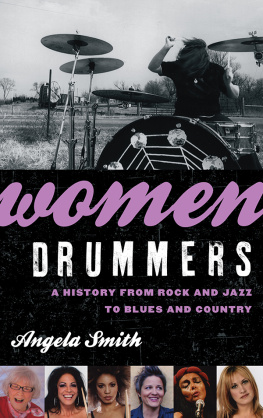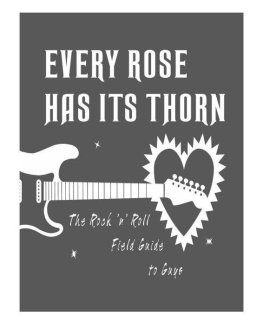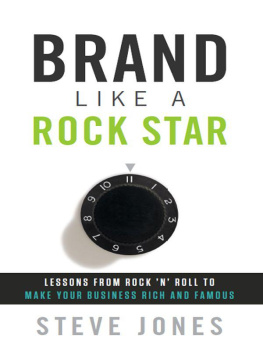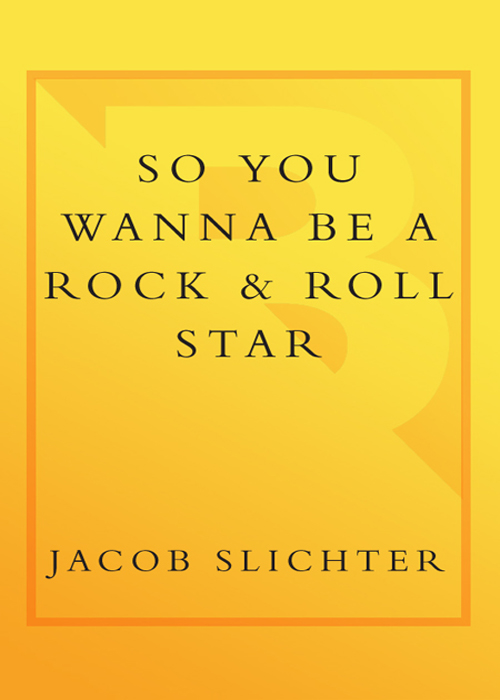
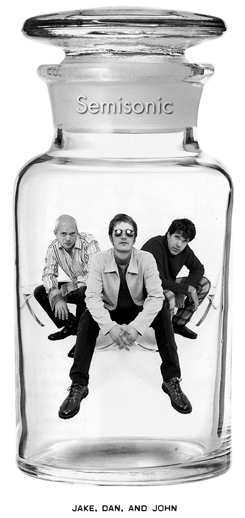
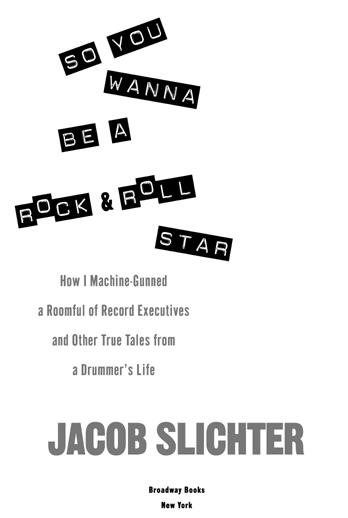
CONTENTS
FOR MY PARENTS
INTRODUCTION
When my friendsintroduce me to their friends, it often goes like this:
Bob, this is Jake. Jake's a rock star!
Bob looks me over. Really?
Well, I don't know if I'd call myself a
My friend continues. Jake's the drummer in Semisonic.
Bob smiles and shrugs. Semisonic? Never heard of you.
Most people don't know who we
Jake, don't be so modest! Come on, Bob, you know Semisonic. You heard them all the time on the radio. Remember that song Closing Time'?
Wow, you wrote Closing Time'?
No, I'm the drummer.
Bob divides Closing Time by drummer and remains moderately impressed. So, you're a rock star. What's that like? Before I can answer, his smile reveals an imagination already at work, most likely reveling in the kind of visions I myself have had.
Perhaps you, too, have entertained such air-guitar fantasiesrocking out in front of thousands of cheering fans and shouting THANK YOU! into the microphone. In your rock-star daydreams, you are your most confident self: On stage, you lean back with closed eyes as your right hand windmills over your head and down across the strings of your guitar. In front of the camera, you cock your head to the side and melt the lens with a mysterious smile. Before the interviewer's microphone, you uncork a sparkling wit. Life is a wellspring of adoration from a world of fawning strangers. You can see yourself walking down the street, stopping to sign autographs with breezy self-assurance as your song plays on a nearby radio. (The DJ at the station loves you, too.)
As I waited through my teenage years and beyond for the chance to realize those bright fantasies, I also had darker ones, perhaps also familiar to you. I imagined a lonely and depressing world where a struggling band sells the rights to its music for a pittance, only to watch the record company (run by an evil genius) rake in millions. Perhaps stardom would be a vacuous existence where the quest for a meaningful life and the enjoyment of friendships were replaced by snorting cocaine and staring in the mirror. These rival visions of the rock world each contain elements of truth, but neither of them is as strange as the reality that eventually transformed my life.
Rocking on stage in front of thousands, as I did many times, was an unsurpassable thrillall the more so because I had survived panic attacks on tiny club stages in front of a few dozen. Signing an autograph, which I've done thousands of times, required trial and error before I learned how to do it without feeling like an idiot. I learned about the unfair arrangements that underlie record deals and the countless ways that success is bought and sold. Instead of becoming outraged, though, I felt the myopia and illogic of the music business slowly become my own. When my bandmates and I received platinum record awards for having sold one million albums, the mood among those gathered for the occasion was somber. Why? Because we hadn't sold three million.
This book is a drummer's-eye view of that strange world, which, like all reality, is both better and worse than fantasy. Here is your chance to see what it's like to sit behind the drum set facing the camera on Letterman; eavesdrop on arguments in recording studios; walk along backstage hallways past Prince, Sheryl Crow, Whitney Houston, Garth Brooks, and Courtney Love; try on endless racks of expensive clothing; star in rock videos, even if they are ones that few people will ever see; stretch out in the back lounge of a tour bus; shake hands with the power brokers of radio; suffer the idiotic opinions of record executives; drink Champagne at the Grammys; sit through an anxiety-filled interview with Howard Stern; travel the world wondering if you're famous, kind of famous, soon to be really famous, or a wannabe; and most of all, to enjoy the rush that is found on stage in front of 200 people at a bar in Minneapolis, 10,000 in an arena in Mexico City, or 100,000 on an open field in Glastonbury, England.
Along with my bandmates Dan Wilson and John Munson, I did all of that. From some stages I threw my drumsticks into a swarm of reaching hands, and on other stages I dodged flying bottles and mud. My band was signed to record deals, dropped from them, and then picked up again. I rode in limousines, paraded down red carpets in front of flashing cameras, signed those countless autographs, and even checked into hotels using an alias. In five years, I rose from anonymityworking as an office tempto something like stardombeing hailed by a stranger in Paris and asked, Are you the drummer for Everclear?
No, I'm the drummer for Semisonic, and this is my story.
ChapterI
JUMP START
It's never snowedin Minnesota during the month of July. The boundary waters up north, however, have tasted light accumulations in August and June, and as for the months in between, keep those winter boots handy. From autumn to spring, Minnesota is a frozen soundscape of snowplows, snow shovels, windshield scrapers, and auto ignitions laboring to turn over. Once, to get into my ice-entombed car, I needed a rubber mallet, seventy-five feet of extension cord, and a blow dryer. The long brutal winters, however, are sometimes credited with fostering Minneapolis's vital music scene. Without such horrible weather keeping them inside with their guitars, the theory goes, the world might never have heard of Bob Dylan, Prince, the Suburbs, the Replacements, Husker Du, Babes in Toyland, the Time, Soul Asylum, or the Jayhawks.
It takes more than blizzards and musicians to sustain this thriving scene. It takes fans, and the fans in the Twin Cities are famous for pushing their cars out of snowdrifts, driving down to Minneapolis's prized rock club, First Avenue, and lining up around the block in subzero temperatures on a weekday night to get through the doors before the tickets sell out. Those fans and the bands they love make a potent combination. I'll never forget watching Soul Asylum rule the stage while the body heat from the crowd of 2,000 thawed my frozen jaw. With their amplifiers turned up past the breaking point, the band spilled back and forth across the stage and brought the crowd seesawing with them, as if we were all on the deck of a ship. Singer Dave Pirner whipped his long hair in circles and screamed, I want somebody to shove! I need somebody to shove! I want somebody to shove me! An overexcited fan launched a cup of beer from twenty rows back, and it soared over the crowd and exploded on Karl Mueller's bass guitar. Pirner pointed into the crowd and shouted into the mike. We're gonna find out who fuckin' threw that, and when we do, we're gonna kick your ass. And everyone here's gonna help us do it! The crowd roared its approval.
I was a musician in my early thirties, still living under the cloud of disappointment that had followed me since graduating six years earlier from Harvard, a place for which I was poorly prepared and which in every regard had annihilated my self-confidence. I had intended to major in music, but after completing a year of study at the Berklee College of Music, for which Harvard's music department had promised me credit, I received a cold letter from the chairman of the department rescinding this promise and inviting me to find another course of study. I wandered from major to major, eventually settling on Afro-American studies, where I quietly explored my interests in race, politics, music, and literature. I entertained visions of graduate school, but such daydreaming was brought to an abrupt end when I opened the envelope containing the miserable grade given to my senior thesis, and the accompanying terse comments on its shabbiness. I graduated with a lackluster record and threw my diploma in a storage box. So much for plan B; back to plan Arock stardom.
Next page

